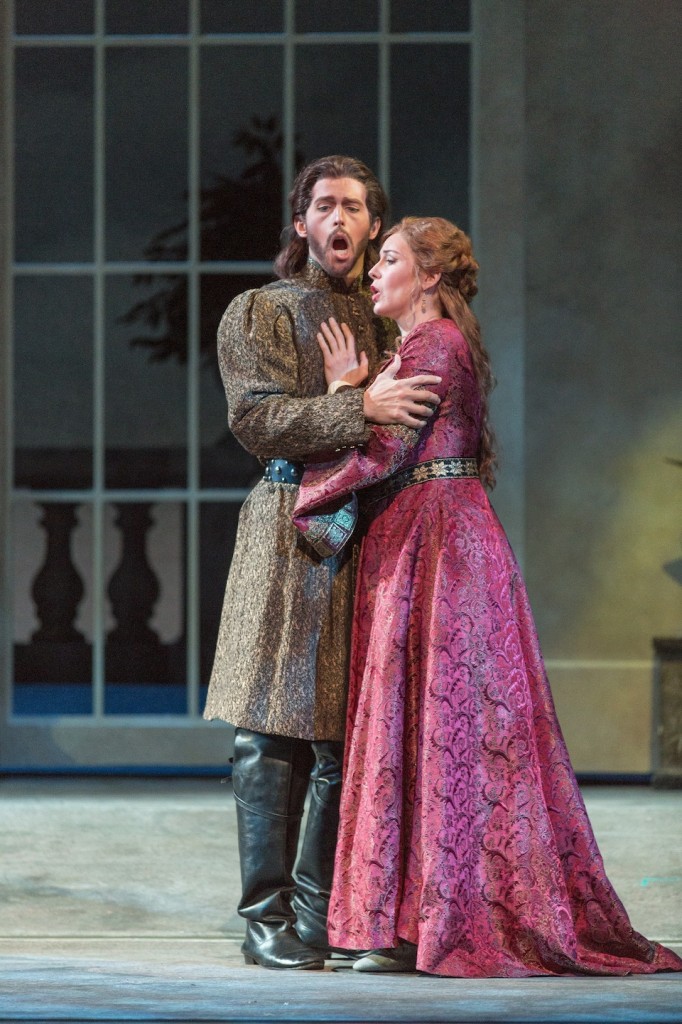Sarasota Opera makes a powerful case for Verdi’s “Jerusalem”
The main attraction for operaphiles this year in Sarasota is Verdi’s Jerusalem, one of the many rarities presented over the company’s decades-long survey of Verdi’s complete works.
Under the baton of artistic director Victor DeRenzi, Sarasota Opera served up a powerful, taut and well-sung performance Saturday night that made a stronger case for Jerusalem as a compelling piece in its own right than history has dictated.
With short time to fulfill a Paris commission, Verdi requested that he be allowed to rework I Lombardi alla prima crociata, a work that received an indifferent reception four years earlier.
While not a completely new opera, Jerusalem is much more than just a French translation of Lombardi (which was presented by the company in 2011). The principal Christian crusaders theme and love triangle were kept, although Gaston, a new character, is now the protagonist and lover of Helene. The crusaders become French rather than Italian, and the locations of the framing scenes are changed. Musically, Verdi wholly reorchestrated the work, added a ballet for the Parisians, and a striking new “degradation scene” in which the unjustly condemned Gaston is ceremoniously stripped of his authority and his helmet and armor are destroyed.
Jerusalem enjoyed great success in Paris and, after Ernani, was the most performed early Verdi work in the U.S. in the nineteenth century, racking up ninety performances in New Orleans alone.
Is Jerusalem a “lost” masterpiece? Not quite. I would say the delightful comedy Un giorno di regno—presented in Sarasota last year—is a more likely candidate for admittance to the canon, uncharacteristic stylistically though it is. But Jerusalem is, overall, a tighter, more convincing opera than I Lombardi and surely deserves more than its current neglect.
As in its previous incarnation, Jerusalem, contains much sensational music, including some of Verdi’s finest (and most neglected) choruses, several memorable arias, the famous trio, and a soaring quartet with chorus to finish Act 1. There is also the strange and remarkable additional scene of Gaston’s denunciation, and a wonderful passage with the offstage women’s choir singing of Christian forgiveness while the embittered Roger plots his revenge against Gaston for stealing Helene. (The ballet, uncharacteristically for the usually completist DeRenzi, is cut for these performances.)
Sarasota Opera has enjoyed some of its greatest successes with lesser known works by Verdi and others. (Last season’s devastating production of Carlisle Floyd’s Of Mice and Men in the company’s sadly discontinued American Classics series was a recent high water mark.)
Such was the case again Saturday with Jerusalem, boosted by an excellent cast, magnificent choral singing and DeRenzi’s idiomatic and combustible conducting.
The standout of the large cast was Danielle Walker as Helene. Ideally one would like a voice with greater tonal richness and weight, but the Virginia-born soprano threw herself into the demanding role with daunting fire and commitment as if her life depended on it. Walker, also impressive as Giuletta in Un giurno last season, brought an apt tonal purity to Helene’s Ave Maria and was dramatically terrific. She showed fearless vocalism in her defiant scene with the Emir, and her gleaming high notes soaring thrillingly over the massed chorus and ensembles.
Walker and Heath Huberg as Gaston made a handsome couple, blending affectingly in their Act 2 duet. At times a certain tonal rawness crept into his undertone, but, apart from an unheroic falsetto high C, Huberg sang with a robust and plangent tenor and made a worthy enough besieged hero.
The character of Roger who goes instantaneously from one of Verdi’s most despicable villains to a repentant holy man, was sung by company regular Young Bok Kim with his commodious bass and fine expression if somewhat indecipherable French. Jeffrey Beruan displayed a booming voice as the Papal Legate, Matthew Hanscom was a fine Count of Toulouse, and Keith Brown a solid Emir.
The Jeffrey Dean-Howard Tsvi Kaplan Lombardi production remained effective with the addition of a gallows set for the new scene. Martha Collins directed the often-complicated action solidly and efficiently.
The orchestra is less polished this season than has historically been the case, with myriad ensemble lapses in strings, winds and brass across all of the weekend performances. Even so, under the idiomatic baton of Victor DeRenzi, Sarasota Opera served up a largely dramatic and incisive account of this score.
The choral singing was drop-dead sensational—from the luminous women pilgrims in Act 4, to the triumphant final chorus, which likely could have been heard in Bradenton. Under Roger L. Bingaman’s direction, the polished and powerful singing of the Sarasota chorus (aka the company’s Studio Artists) in Jerusalem proved the equal of any major opera house chorus in the country.
Jerusalem runs through March 22. sarasotaopera.org.
